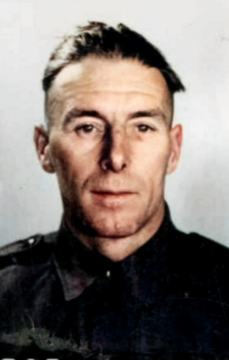
BAKER, Basil Edward
| Service Number: | NX46586 |
|---|---|
| Enlisted: | 11 July 1940, Newcastle, NSW |
| Last Rank: | Sergeant |
| Last Unit: | 2nd/12th Field Ambulance |
| Born: | Kingston on Thames, England, 22 November 1904 |
| Home Town: | Maitland, Maitland Municipality, New South Wales |
| Schooling: | Not yet discovered |
| Occupation: | Storeman and Timekeeper |
| Died: | Presumed to be dead, Ambon, Netherlands East Indies, 20 February 1942, aged 37 years |
| Cemetery: |
No known grave - "Known Unto God" |
| Memorials: | Ambon Memorial, Australian War Memorial Roll of Honour, Ballarat Australian Ex-Prisoners of War Memorial, Paterson District War Memorial |
World War 2 Service
| 3 Sep 1939: | Involvement Sergeant, NX46586 | |
|---|---|---|
| 11 Jul 1940: | Enlisted Australian Military Forces (WW2) , Sergeant, NX46586, 2nd/12th Field Ambulance, Newcastle, NSW |
Help us honour Basil Edward Baker's service by contributing information, stories, and images so that they can be preserved for future generations.
Add my storyBiography contributed by Mari Walker
Son of Edward Cyril and Margaret Elizabeth Baker; husband of Hester Baker, of Paterson, New South Wales, Australia.
Sgt Basil Edward Baker was born in Kingston on Thames, England, in 1904 and came to Australia as a boy. In 1932 he married Hester (nee Weeks) and enlisted in the Army in 1940.
Sgt Baker was a member of the 2/12 Field Ambulance which was part of Gull Force, arriving in Ambon on 17 December 1941.
Gull Force consisted of 1131 Australian soldiers, Dutch and local native troops whose objective was to occupy Ambon Island and hinder the Japanese advance. After a number of short fierce battles, fighting on Ambon ceased on 2 February 1942. Many men were captured but those who had survived the battle for Laha (approximately 315 men) were later executed and buried in one of four mass graves.
Investigations after the war determined it was impossible to positively identify many of the remains found at Laha and these ‘war dead’ were declared “missing and for Official Purposes Presumed to be Dead, 20 February 1942”. The remains which were found were reinterred in the Ambon War Cemetery.













